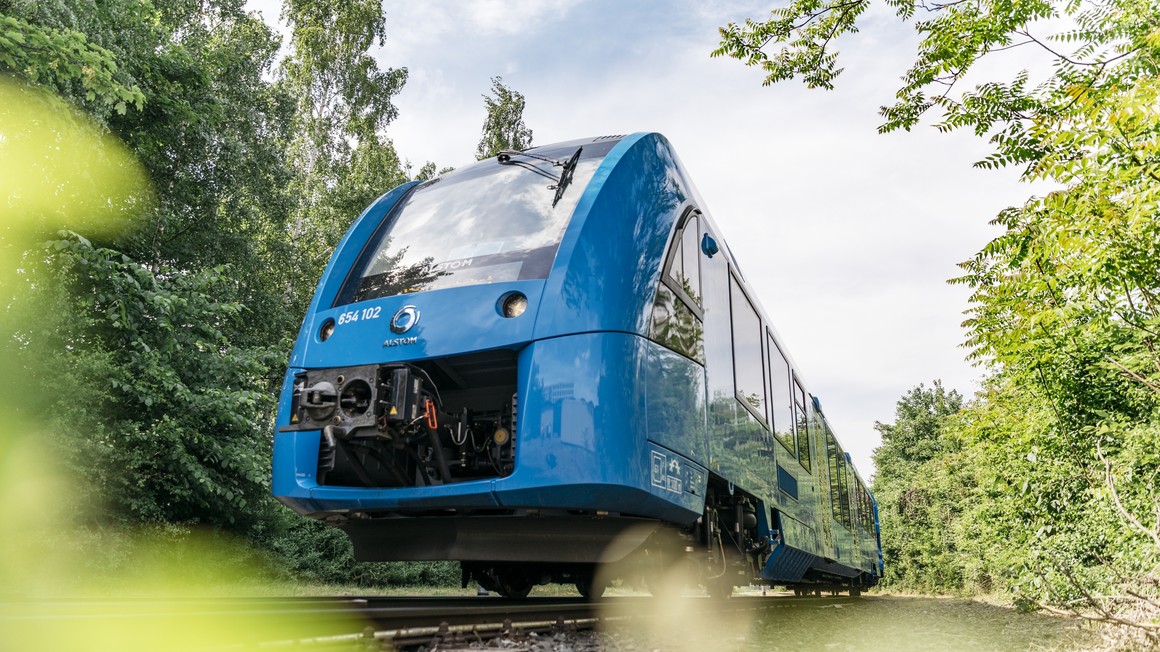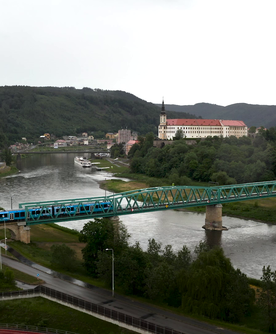
RMV’s subsidiary fahma orders the world’s largest fleet of fuel cell trains from Alstom
RMV’s subsidiary fahma orders the world’s largest fleet of fuel cell trains from Alstom

- A contract worth around €500 million
- Alstom’s share amounts to €360 million
- Vehicles will replace diesel trainsets on four regional train lines in the Taunus region from 2022
RMV’s subsidiary fahma issued a tender for 27 fuel cell trains throughout Europe. Now the winner has been determined: The French manufacturer Alstom will deliver the vehicles of type Coradia iLint by the timetable change in 2022. In addition to the trains, the order also includes the supply of hydrogen, maintenance and the provision of reserve capacities for the next 25 years. Alstom offers the supply of hydrogen in cooperation with Infraserv GmbH & Co. Höchst KG, with the filling station being located on the premises of the Höchst industrial park.
“The purchase of 27 vehicles is a lighthouse project for fuel cell mobility, about which I’m very pleased,” says Enak Ferlemann, Parliamentary State Secretary of the German Ministry of Transport and Infrastructure. “The federal government supports this investment in climate-friendly mobility by assuming 40 percent of the additional vehicle costs incurred in comparison to diesel vehicles, as well as by providing proportional support for the hydrogen filling station. The project can serve as a model for the German transport ministry. We hope that many other projects in Germany will follow this example.”
World’s largest fleet of fuel cell trains
“On Hesse’s tracks you can still find many diesel vehicles today as overhead lines are missing. Fuel cell traction is therefore a quickly feasible alternative to expensive electrification,” says Tarek Al-Wazir, Hesse’s Minister of Transport. "In Hessen, transport is responsible for one third of greenhouse gas emissions. Steam instead of diesel soot is therefore an exciting approach. We will continue to actively support the project and make every effort to ensure that the necessary adaptations to the rail infrastructure around the hydrogen filling station in Höchst make rapid progress."
"This award sets two records: With the commissioning of the new vehicles in 2022, RMV will have the world's largest fleet of fuel cell trains in passenger transport and it is the largest order in the history of our subsidiary fahma," says RMV Managing Director Prof. Knut Ringat. "After electrically powered trains, electric buses and hydrogen buses, we are now offering our passengers a further opportunity to travel without emissions. This milestone makes me proud and is a giant step towards a mobility without pollutants".
This order is also of great importance to Dr. Jörg Nikutta, Managing Director of Alstom in Germany and Austria: “We are very pleased that Alstom’s zero-emission Coradia iLint regional trains will be operated in Hesse in the near future, allowing climate friendly transportation of passengers in the Taunus region. This new success, coupled with Coradia iLint’s previous success, demonstrates how trendsetting and sustainable transportation is already a reality.”
The new fuel cell trains will replace the existing diesel-powered trains on the following lines: RB11 (Frankfurt-Höchst – Bad Soden), RB12 (Frankfurt – Königstein), RB15 (Frankfurt – Bad Homburg – Brandoberndorf) and RB16 (Friedrichsdorf – Friedberg). The total order value amounts to around 500 million euros.
Refueling in the Höchst industrial park
The new trains will be refuelled at Industriepark Höchst. Dr. Joachim Kreysing, Managing Director of Infraserv Höchst, the operator of Industriepark Höchst, is delighted that the site will play an important role in the further development of this forward-looking technology: “With its existing hydrogen infrastructure, Industriepark Höchst is an ideal filling station location for fuel-cell vehicles. The operation of the hydrogen filling station for trains as a supplement to the tanking facilities for buses and trucks fits in perfectly with our concept, with which we as an innovative company are further developing our energy supply concepts and are relying on environmentally friendly energy carriers”
For Hochtaunuskreis District Administrator Ulrich Krebs, the fuel cell trains in the Taunus network are a reasonable alternative. "In addition to electrifying the S5 to Usingen, the fuel cell trains offer various advantages for routes that have not yet been electrified," says Krebs, who is also deputy chairman of the RMV supervisory board. "Commuters benefit from more space in the trains and a significantly quieter journey because the engine noise of the vehicles is quieter due to the electric drive. This is also an advantage for the people living near the lines."
World’s first passenger train powered by hydrogen
Coradia iLint is the world’s first passenger train powered by a hydrogen fuel cell, which produces electrical power for traction. The trains are as silent as a suburban train and are locally emission-free as they only emit steam and liquid water into the environment.
In addition, this type of vehicle is characterized by several innovations: clean energy conversion, flexible energy storage in batteries as well as intelligent management of traction power and available energy, combined with appropriate driver assistance systems. Specially developed for the use on non-electrified lines, the Coradia iLint allows clean, sustainable train operation while maintaining high performance and economic use for its customers.
160 seats per vehicle
The world’s first two hydrogen trains have already been in regular passenger service in the Elbe-Weser network in Lower Saxony since September 2018. The Local Transport Authority of Lower Saxony (Landesnahverkehrsgesellschaft Niedersachsen, LNVG) will operate 14 Coradia iLint trains on that line from 2021. RMV is therefore the second operator to embrace environmentally-friendly hydrogen technology without exhaust gases, using the vehicles provided by fahma.
All 27 new fuel cell trains will be equipped with comprehensive passenger information systems, such as monitors with real-time information. Moreover, they will be provided with space for bicycles, wheelchairs and prams and will offer complimentary WiFi access to passengers during their journey. The new trains will provide 160 seats so that the capacity of the lines in the Taunus subnetwork will be increased by up to 40 percent, especially for commuter trains in rush-hour traffic.
